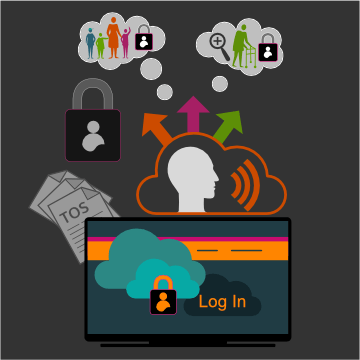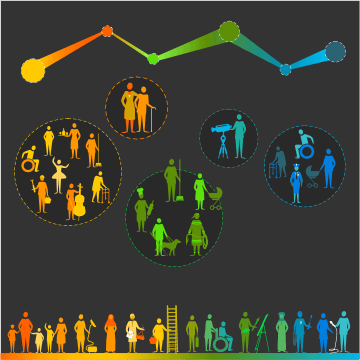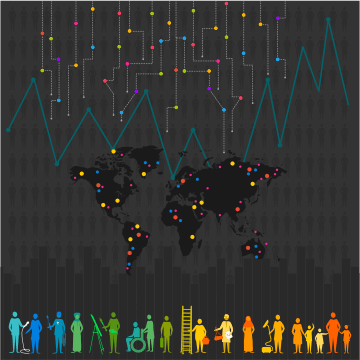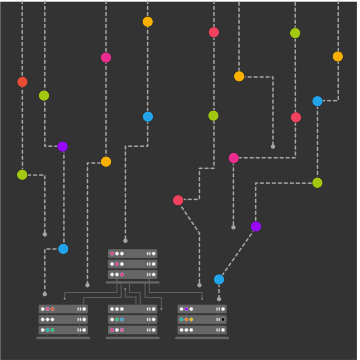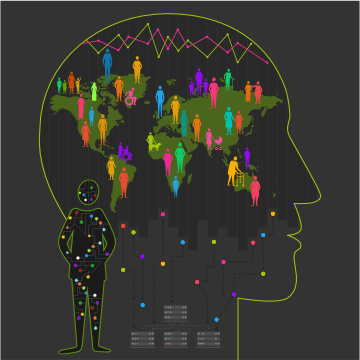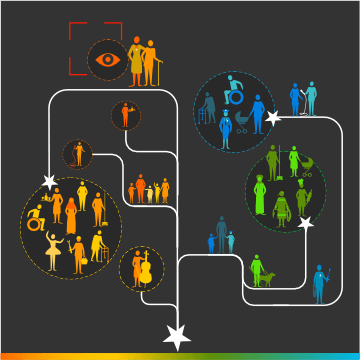Signing in: audience experiences of data practices in the media

Helen Kennedy, Robin Steedman, Rhianne Jones
Introduction
Signing In aimed to explore what diverse audience groups feel about signing in to access BBC services, a process which was being rolled out at the time of the research. The research focused on the views of groups that the BBC feels it ‘under-serves’ and other groups that have a history of being socially marginalised in the UK. In qualitative focus group research with 68 participants, Signing In investigated what diverse audiences know and think about: a) the data that they share through signing in; b) about what happens to these data; and c) what should happen to them. We use the term ‘data practices’ as a shorthand to refer to these various things.
Publications
Kennedy, H., Steedman, R. and Jones, R. (2020) Approaching public perceptions of datafication through the lens of inequality: a case study in public service media Information, Communication and Society.
Steedman, R., Kennedy, H. and Jones, R. (2020) Complex ecologies of trust in data practices and data-driven systems Information, Communication and Society.
About participants
- 41 women, 1 non-binary, 26 men
- Aged 16-90, 19 participants aged 16-24, 9 participants aged 25-34, 17 aged over 65 (including 11 aged 75 and over)
- 7 Asian/Asian British, 5 Black African/Black British, 3 Central and East European, 3 mixed/multiple ethnic groups, 1 other ethnic group, 48 white British, 1 white other
- 14 had no qualifications, 18 had degrees, (including 7 with higher degrees).
- 26 participants had disabilities
- The majority use data-driven media services (such as iPlayer, Netflix, Amazon Prime Video, YouTube, or Spotify) on a weekly basis.
- Half of the participants used iPlayer on a weekly basis, 10 participants did not use the BBC at all.
- Almost all young people used data-driven media but less than half used iPlayer.
- Older people were less likely to use data driven media services but of those that did, most used iPlayer exclusively.
- Of the 11 participants who do not use data driven services weekly, nine are older or have a disability.
Views about sign in and personalisation in the BBC context
- Some participants felt strongly that, as a public service broadcaster, the BBC should not ask people to sign in and it should not personalise content.
- For others, the BBC’s public service remit did not inform their views on the BBC’s introduction of sign in and its use of personal data to personalise services.
- Some participants found these practices generally acceptable, and others found them generally unacceptable, whether they are undertaken by public or commercial organisations.
- At the time of research, upon registering for an online account, users had to share their postcode. A concern expressed about this data practice in online discussions was that the data could be used to enforce TV License payment in the future. We asked our participants whether they shared this concern or whether, by contrast, they thought using sign in data to enforce license payment would be a good thing.
- The majority of participants thought there was a relationship between the sign in data that the BBC gathers and TV license payment monitoring because of the collection of postcode data, and most of them were concerned about this.
- Age was an important factor in relation to views about personalisation. There was a contrast between the views of young and older participants.
- A major concern about signing in to access personalised content and services for young users was that they are required to do so with great frequency. This led them to feel that what was offered to them once they had signed in had to be worth the effort.
- Very few young participants were concerned about the data practices that underlie the personal profiling on which recommendations and personalised content are based.
- Young participants were more positive about recommendation systems and personalisation than older participants.
- Older participants tended to be either ambivalent or negative in their views about the personalisation that results from signing in to access BBC services.
- Some older participants felt overwhelmed by the range of digital and data-driven services that are available. This played a role in older people’s strong feelings about them.
- Some older participants felt that while personalised services were not of use to them, they could be beneficial for other older people, for example mobility-reduced people who spent more time at home.

Diversity in knowledge and feelings about BBC data practices
- Age, disability, and socio-economic status appeared to play a role in shaping understandings of and feelings about BBC data practices.
- Many young participants (16-34) had a good understanding of why the BBC had introduced sign in and how the organisation would use the data that signing in generated.
- However, young people with lower levels of education tended to know less about data driven systems that their more educated peers.
- And young participants with mild learning disabilities, on the whole, did not understand how the BBC used their personal data, or how data-driven systems (such as personalisation and recommendation services) worked.
- Older participants (65 or over) were less likely to understand how data-driven systems worked than younger participants, except those with mild learning disabilities.
- Some older participants chose to opt-out of using data-driven media. Some felt left behind by digital and data-driven developments, which they often wanted to understand, but they struggled to do so.
- Limited knowledge and understanding of data practices and data-driven systems did not stop people having strong feelings about them.
- Young participants with learning disabilities had limited understanding of how their personal data is used by online media service providers, but they nonetheless expressed strong feelings about data practices more generally, such as fears about security, desire for privacy, reluctance to share certain data such as postcode.
- These findings suggest that what people feel about data practices plays an important role in shaping perceptions of data practices, regardless of their knowledge and understanding of these practices.
- Unemployment and experiences of poverty were factors that appeared to inform knowledge and feelings about data practices.
- Some unemployed participants reported limited or no use of digital and data-driven media because of limited available finances. Formerly vocal and engaged in the discussion, they fell silent when it moved from media use in general (including reading newspapers) to focusing on data-driven services and practices.
- Other participants who were explicit about their financial disadvantage sidestepped questions about BBC data uses to focus on how broader conditions of inequality affect people’s engagement with the media, indicating that they consider such inequalities to be relevant to attitudes to data practices.
Complex feelings of trust
- Sometimes, people’s feelings about an organisation’s data practices have little to do with the organisation’s actual data practices, and more to do with their feelings about the organisation’s broader integrity.
- Participants’ feelings about BBC data practices sometimes resulted from the degree to which they trust the organisation. The specific context of the BBC and its historical status as the nation’s ‘Auntie’ for some participants served to shape their perspectives on its trustworthiness when it comes to using audience data.
- For example, some participants trusted the BBC and therefore trusted it with their data. Others did not trust the BBC and therefore did not trust it with their data.
- But sometimes, how participants felt about the BBC was not relevant to their feelings about its uses of their data. Instead, their feelings about the wider data ecosystem in which BBC data practices take place were more important.
- For example, some participants trusted what the BBC says about how it will use their data, or they trusted its intention to protect their data, but not its ability to do so, because they felt that the wider data ecosystem was insecure.
- Anxiety about the safety of the online world in general limited participants’ trust in BBC data practices, regardless of feelings about this organisation. Even if there was a high level of trust in the BBC, some participants’ trust in BBC data practices was compromised by knowledge and feelings about the wider data ecosystem, such as high-profile stories about data breaches.
- Older participants were concerned about a perceived lack of safety online. Participants with no strong views about personalisation or other BBC data practices (for example, mining social media for audience opinions, or collecting demographic data via sign in) felt strongly about online safety. They felt that, in this context, it was not possible to trust that organisations could use their data as they said they would or as they intended to.
Views about future data management models: Personal Data Stores
- We described common data management models to participants, which largely involve service users agreeing to hand over control of their data to service providers, and an alternative Personal Data Store (PDS) model, which gives users control over what happens to their data and who it is shared with.
- Participants generally felt that the PDS model was better than the current model, and this was almost always because it offered them more control and/or choice over what happens to their personal data.
- However, participants also had some concerns about the PDS model, relating to a) the time it would require to use such a model and b) issues of security.
- Participants liked the idea of a PDS but they did not want to be personally in charge of their data. They were worried about having to spend time managing their data and the labour this would entail. Rather than engaging in time-consuming personal data management themselves, they wanted to feel that their data was safe.
- Some participants who did not feel that personal data is safe online felt that a PDS would not change this. They felt that data managed through a PDS model would be vulnerable, as in any other model.
- A small number of participants were concerned about the accessibility and usability of a PDS model for people who are not ‘digital natives’. Some participants felt that older people and people with learning disabilities would struggle to understand such a model. This might put them off using it, and so the use of a PDS model may exacerbate existing social and digital inequalities.
